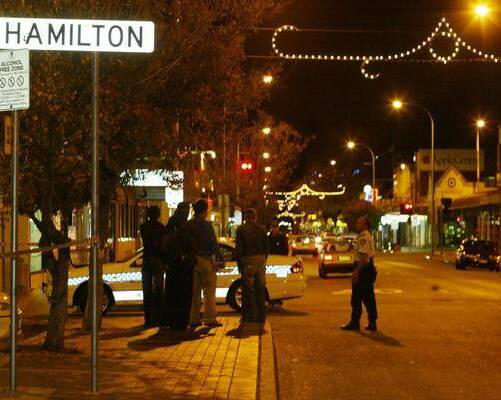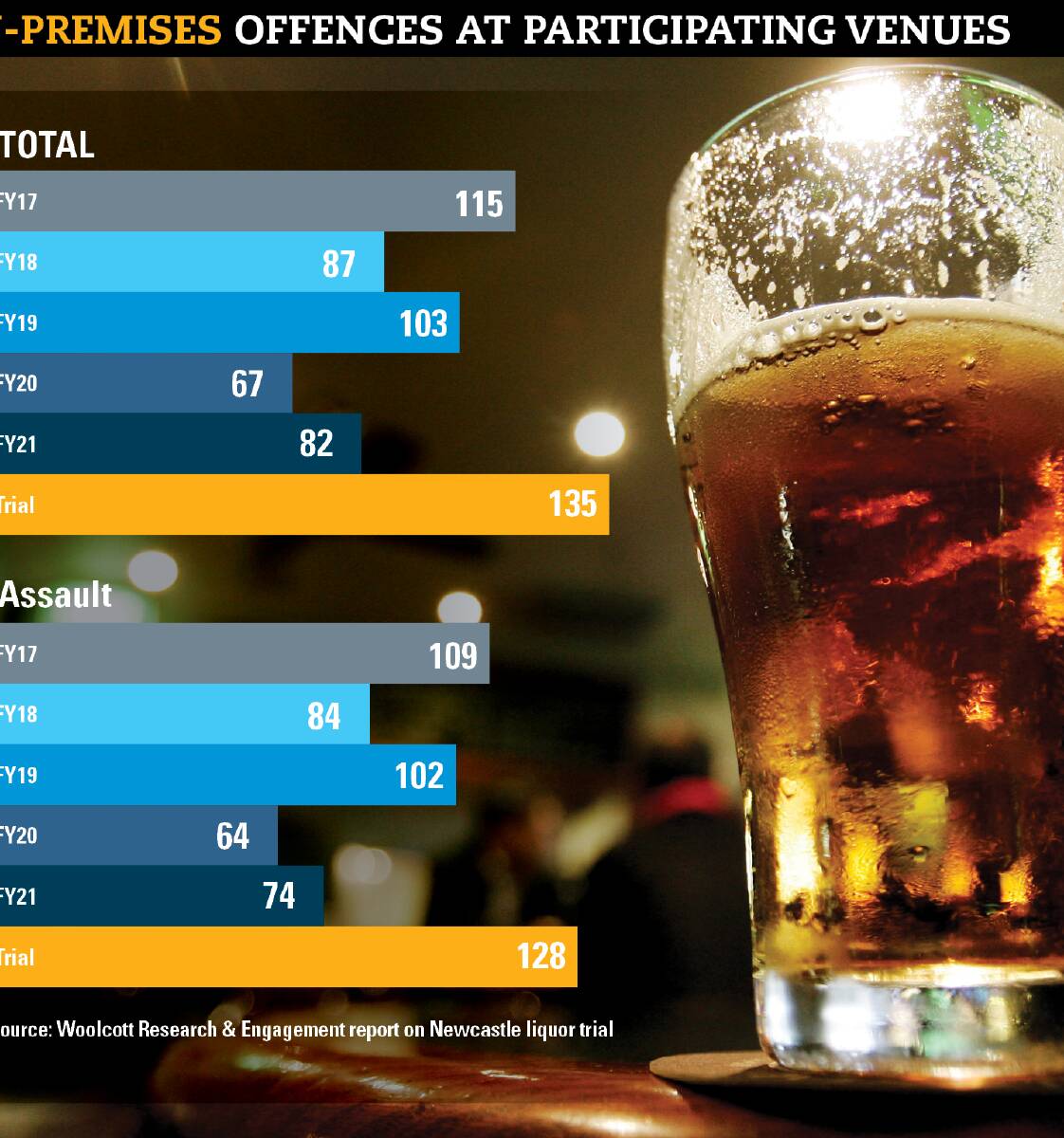
Newcastle's lockout laws have ended after liquor authorities announced on Thursday they would consider applications to relax licence conditions on a venue-by-venue basis.
The Independent Liquor & Gaming Authority published the findings of an evaluation report into a trial of relaxed trading conditions in areas of the inner-city and Hamilton subject to the so-called Newcastle Solution since 2008.
The report found the number of on-premises assaults and incidents of affray had risen 65 per cent at participating pubs and clubs during the trial period but attributed the bulk of these offences to a handful of larger venues.
The authority said the trial report had found most of the 21 participating venues had enjoyed improved patronage, turnover and employment opportunities.
ILGA has imposed the special Newcastle Solution conditions universally across pub and club licences in central Newcastle and Hamilton for 15 years, but the restrictions are not enshrined in legislation.
Thursday's announcement extinguishes that broad-brush policy and allows venues to apply for individual trading conditions.
Newcastle MP Tim Crakanthorp welcomed the outcome of the trial, saying ILGA's decision struck the right balance between safety and invigorating Newcastle.
"You can't punish all the venues for the ones that do the wrong thing," he said.
"That's been the case for a long time here in Newcastle. We've seen these lockout laws go from Sydney and Kings Cross. We're the last place."

Last year's trial removed 1am and 1.30am lockouts, extended liquor trading until 3.30am and suspended restrictions on serving shots and cocktails.
ILGA chair Caroline Lamb said the "wide variations" in alcohol-related offences at the 21 venues in the trial showed it was "vital that any proposals to relax conditions are considered individually".
"After carefully considering the findings, ILGA has resolved that the trial conditions should continue for participating venues until June 30 to give them time to apply for changes to liquor licences," she said.
Ms Lamb said ILGA had taken into account a wide range of data and community and stakeholder views before reaching its decision.
Local Labor politicians, City of Newcastle, the NSW government and the Newcastle alcohol industry have backed relaxed licensing conditions, arguing the city's attitude to alcohol has matured since escalating violence brought about the restrictions 15 years ago.
The police union, doctors' groups and anti-violence campaigners have pushed to keep the restrictions in place.
University of Newcastle academic and inner-city resident activist Tony Brown said the trial outcome "confirms our worst fears that the decision to remove Newcastle's modest alcohol harm controls was a political decision made between the government and the Australian Hotels Association before the trial commenced".
"A senior police official cautioned it would be 'sheer lunacy' to remove Newcastle's modest controls. Senior health officials voiced similar reservations. Welcome to the asylum," he said.
Mr Brown said he was not surprised the significant increase in alcohol offences during the trial were insufficient grounds to declare the trial a failure.
"Once again, the NSW government and ILGA have placed pub and club profits ahead of Newcastle's public and emergency worker safety and amenity," he said.
"The police information contained in the report found a litany of serious increases in alcohol-related crimes and a litany of failures associated with the trial."
The trial report says participating venues recorded 135 on-premises offences during the October 2021 to October 2022 trial period, up 65 per cent from 82 in the 2021 financial year despite a sharp drop in patronage numbers during a COVID outbreak in Newcastle over the 2021-22 summer.
The trial-period offence numbers were up 17 per cent compared with a baseline year of 2017, before light rail works and COVID-19 disrupted inner-city trade.
Mr Brown questioned why the report included survey results showing participating venue operators believed alcohol violence had not increased during the trial.
"The publication of these erroneous 'findings' goes to the heart of the reliability, impartiality and credibility of the report and its adoption by ILGA.
"The views of the pub owners who will profit from this decision are preferred over those of public safety, health and amenity in Newcastle's CBD."
The report by Sydney consultants Woolcott Research & Engagement says the rise in offences at participating venues is consistent with increases in offences at all venues, including those not part of the trial.
It says half of all on-premises offences since 2017 have occurred at four of the 21 participating pubs and clubs, but the report does not name the problem venues.
The report found the number of off-premises offences, including assaults, sexual assaults and malicious damage, did not change during the trial period.
Drink-driving offences linked to the participating venues rose from 26 to 57, or 119 per cent, during the trial compared with the year to July 2021. This count was 10 per cent lower than in 2018.
Resident noise complaints numbered 18 in 2020, 47 in 2021 and 34 during the trial.
A survey of 457 residents in the suburbs of Newcastle, Newcastle West, Newcastle East, Hamilton and Islington found older respondents were more concerned about relaxed licence conditions than younger people.
Half of all survey respondents agreed the positives of the trial conditions would outweigh the negatives, while 31 per cent believed the reverse was true.
Some residents saw the relaxed rules as an opportunity to stay out at night and create a more vibrant city, while others were concerned about public drunkenness and noise.
Mr Crakanthorp said Newcastle deserved the same opportunities to socialise as the rest of the state.
"It allows the good venues to continue and have that late-night licensing, which is fantastic, and it also allows for perhaps the more [rowdy venues] to have to go through more process to prove that they can do that responsibly," he said.
"They may not get extra licensing and, certainly, if they don't deserve it, if they've got a bad record, they shouldn't get it."
The participating venues were Bar Petite, Argyle House, Clarendon Hotel, Cambridge Hotel, Crown & Anchor Hotel, Customs House, Grand Hotel, Hamilton Station Hotel, Great Northern Hotel, King Street Hotel, Kent Hotel, MJ Finnegans, Sydney Junction Hotel, Newcastle Hotel, The Exchange Hotel, Northern Star Hotel, Greenroof, Queens Wharf Brewery, The Lucky Hotel, The Station and Rogue Scholar.
The evaluation report found average weekly business turnover was up 36.7 per cent compared with a September 2019 baseline period, though this figure could have been higher if not for the COVID outbreak.
The NSW government oversaw an earlier trial in 2020 and 2021 which extended trading hours and relaxed drink conditions in restaurants and bars.
Mr Brown said the government had denied the community input into ILGA's decision by keeping the latest trial report secret until the authority had determined how to proceed.







